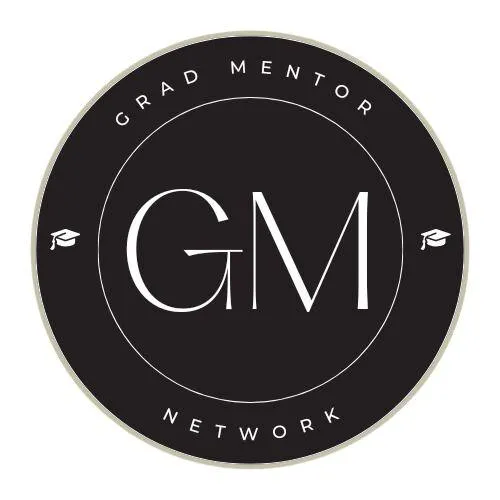

Welcome to the Grad Mentor Network
Unlock Your Academic Potential with Our Exclusive Membership Plans

WHO WE ARE
Unlock Success with Tailored Academic Support
At Grad Mentor Network, led by Dr. Robinson and showcased on renowned platforms such as "Dissertation in 90 Days" and "Club 3E," we offer a comprehensive support system for graduate and doctoral students. Leveraging the expertise of WritersER, which helps master's and PhD candidates achieve approval in six months or less, and our Grad Bootcamps, designed to help students navigate the complexities of academia through bootcamps, our programs are meticulously crafted to support you through every stage of your academic journey. Subscribe today and unlock access to an extensive array of resources, expert guidance, and a supportive community tailored specifically to your academic needs.


Mentoring
Personalized guidance from experts, including Dr. Robinson, to help members navigate their academic journey effectively.

Resources
Access to a comprehensive library of study guides, templates, and specialized training materials tailored for graduate and doctoral studies.

Community
Connection to a private online network where members can interact, share experiences, and support each other through their academic challenges.
Tier 1:
Essential Support - $19/month
Podcasts
Tune in to five weekly podcast episodes packed with strategies for dissertation success, effective time management, research methodologies, and tackling graduate challenges.
Community Access
Join our exclusive online community to connect with peers, share your journey, and find support from fellow students.
Newsletters
Receive five weekly newsletters filled with actionable advice, insightful tips, and motivational content designed specifically for graduate and doctoral students.
Live Q&A Sessions
Engage in our monthly live Q&A sessions with Dr. Robinson and other field experts, designed to answer your burning questions and provide personalized guidance.
Tier 2:
Advanced Support - $49/month
(Includes Tier 1)
GradCoach.io App Access Coming Soon
Get tailored training covering everything from proposal writing to thesis defense, exclusively designed for PhD and Master's students.
Weekly Live Training
Participate in live interactive sessions that delve into essential aspects of the academic journey, offering real-time feedback and personalized advice.
Resource Library
Study guides, templates, and essential research tools sent to your email.
Exclusive Discounts
Enjoy special discounts on Grad Mentor Network-branded merchandise and academic tools.
Digital Calendar
Start each month with a new, beautifully designed digital calendar wallpaper.
Tier 3:
Premium Support - $79/month
(Includes Tiers 1 and 2)
Dissertation Tools
Access downloadable exercises and worksheets tailored for each phase of your dissertation, keeping you organized and on track.
Monthly Digital Product
Receive a new digital product each month, such as e-books, specialized training videos, or unique templates.
Monthly Mastermind Sessions
Join small group mastermind sessions that focus on specific academic challenges, offering tailored solutions and peer support
One-on-One Mentoring
Benefit from two personal mentoring sessions per month, providing you with expert guidance tailored to your individual needs.
Priority Support and Exclusive Content
Enjoy priority email support and behind-the-scenes looks at training sessions and upcoming projects.
Personalized Editing Support (10 Pages per month)
Receive tailored editing assistance for up to 10 pages each month, ensuring your content is polished and professionally refined to meet your specific needs.
Tier 4:
Exclusive Support - $99/month
(Includes Tiers 1, 2, and 3)
Recognition and Thanks
Be acknowledged by name in all new podcast episodes and video descriptions.
Specialized Webinars
Gain access to exclusive webinars discussing advanced topics like grant writing and career planning in academia.
Personalized Feedback
Receive detailed feedback on your dissertation chapters or research papers from Dr. Robinson or a senior mentor.
Networking Opportunities
Get invitations to virtual networking events with alumni and professionals across various academic fields.
Unique Merchandise
Claim exclusive Grad Mentor Network merchandise not available to other tiers.
Personalized Editing Support (15 Pages per month)
Get customized editing support for up to 15 pages monthly, enhancing clarity, style, and accuracy according to your unique requirements.
Tier 5:
Ultimate Support - $109/month
(Includes Tiers 1, 2, 3, and 4)
Social Media Recognition
Receive a monthly shoutout by name on our social media platforms and YouTube community tab.
On-Screen Credits
Enjoy on-screen recognition as a co-sponsor in every episode of our podcasts and training videos.
VIP Access
Get exclusive tickets to VIP events and workshops, designed to elevate your academic and professional connections.
Advanced Mastermind Sessions
Engage in weekly advanced mastermind sessions with high-achieving peers and field experts.
Exclusive Content Feed
Dive into an exclusive content feed filled with behind-the-scenes updates, additional resources, and more.
Free Books
Enjoy a free book every month from the Doctoral Chronicles Series or authored by Dr. Robinson, up to 12 books a year.
Resources

Coaching and Editing Support for your Dissertation

Books, Newsletters and Podcasts

Bootcamps

TAKING A FRESH LOOK
Membership Tiers
Tier 1
1 Month Essential Support
$19
Weekly Podcasts
Motivational Newsletters
Private Community
Monthly Q&A
Tier 2
1 Month Advanced Support
$49
Tier 1
App Access
Live Training
Resource Library
Merchandise Discounts
Tier 3
1 Month Premium Support
$79
Tier 1 & 2
Dissertation Tools
Digital Products
Bi-Weekly Mastermind
One-on-One Mentoring
Tier 4
1 Month Exclusive Support
$99
Tier 1, 2 & 3
Name Recognition
Specialized Webinars
Personalized Feedback
Networking Events
Tier 5
1 Month Ultimate Support
$109
Tier 1, 2, 3 & 4
Social Media Shoutout
On-Screen Credits
VIP Event Access
Advanced Mastermind
Resource Milestones
Expansive Collection of Guides, Templates, and Training Materials

5,000+
Downloads Achieved

1,200+
Resources Created

Recent Blogs

Time Management Strategies for Graduate Students: How to Stay Productive Without Burning Out
Time Management Strategies for Graduate Students: How to Stay Productive Without Burning Out
Introduction
Graduate school can be demanding, with deadlines, research projects, assignments, and personal responsibilities all vying for your time. It’s easy to feel overwhelmed and fall behind if you don’t have a solid plan to manage your time effectively. But here’s the good news: mastering time management isn’t as complicated as it seems. With the right strategies, you can stay on top of your workload while still having time for yourself. In this post, we’ll explore practical time management techniques to help you stay productive, reduce stress, and avoid burnout.

1. Prioritize Your Tasks with the Eisenhower Matrix
The Eisenhower Matrix is a popular tool for helping you decide which tasks deserve your immediate attention and which can be postponed or delegated. It’s especially useful in graduate school when you’re juggling multiple assignments and research projects.
How It Works:
Urgent and Important Tasks: These tasks should be your top priority, such as meeting deadlines or preparing for a presentation.
Important but Not Urgent Tasks: These are long-term goals like writing your thesis or dissertation. Plan time for them before they become urgent.
Urgent but Not Important Tasks: These tasks often distract you from your main goals, like answering non-essential emails. Delegate or set limits on how much time you spend on them.
Not Urgent and Not Important Tasks: These are time-wasters. Cut them out when possible.
Tip: Create a daily or weekly to-do list and categorize tasks using the Eisenhower Matrix. Focus on "Important and Urgent" first and set aside time for "Important but Not Urgent."
2. Break Down Large Projects into Manageable Tasks
A common mistake graduate students make is waiting too long to start major projects like research papers or dissertations. This leads to panic and rushed work when deadlines approach. The key to avoiding this stress is to break large projects into smaller, more manageable tasks.
Example:
If you’re working on a 30-page research paper, break it down into smaller tasks like:
Research relevant literature (Week 1)
Create an outline (Week 2)
Write the introduction (Week 3)
Complete the first draft of sections 1 and 2 (Week 4)
Tip: Set mini-deadlines for each part of your project and reward yourself for meeting them. This keeps you on track and prevents last-minute cramming.
3. Use Time-Blocking for Focused Work
Time-blocking is a powerful technique for ensuring you’re making steady progress on your tasks. It involves setting aside specific blocks of time for focused work on one task at a time. During these blocks, avoid multitasking and distractions.
How to Use Time-Blocking:
Divide your day into blocks of 1-2 hours.
Assign each block to a specific task, such as reading research articles, writing, or analyzing data.
Take short breaks between blocks to recharge.
Tip: Use the Pomodoro Technique during time-blocks—work for 25 minutes, then take a 5-minute break. After four cycles, take a longer break. This method helps maintain focus without overwhelming your brain.
4. Learn to Say No (And Mean It!)
As a graduate student, you may feel pressure to say yes to every opportunity—whether it’s helping a peer with their project, taking on extra responsibilities, or attending every seminar. While networking and involvement are important, overcommitting can lead to burnout.
How to Say No Politely:
Be Clear: If someone asks for your time but you’re too busy, politely decline by explaining your current workload.
Offer an Alternative: If you still want to help, suggest another way, such as revisiting the request when your schedule lightens.
Tip: Set boundaries by defining your priorities at the start of each semester and limit how much additional work you take on. Saying "no" isn’t selfish; it’s necessary to protect your time and energy.
5. Use Digital Tools to Stay Organized
There are plenty of apps and digital tools designed to help you stay organized and productive. These tools make it easier to manage deadlines, track progress, and avoid missing important tasks.
Recommended Tools:
Todoist or Microsoft To-Do: Task management apps that help you track daily, weekly, and long-term tasks.
Google Calendar: Schedule classes, deadlines, and study sessions. Set reminders for important tasks to stay on top of your workload.
Trello: A visual project management tool where you can break down larger projects into smaller steps and track progress.
Tip: Use these tools to sync tasks across all your devices, ensuring you stay organized wherever you are.
6. Schedule Time for Self-Care
It’s easy to forget about self-care when you’re in the thick of research and writing, but taking care of your mental and physical health is just as important as meeting deadlines. Set aside time in your schedule for activities that help you unwind and recharge.
Ideas for Self-Care:
Physical activity: Go for a walk, stretch, or exercise to reduce stress.
Meditation or mindfulness: Spend 5-10 minutes a day practicing mindfulness or deep breathing.
Socialize: Spend time with friends or family to recharge emotionally.
Tip: Treat self-care as non-negotiable—block out time for it just as you would for important academic tasks. It’s essential for long-term productivity.
Conclusion: Stay Productive Without Burnout
Graduate school requires a delicate balance between productivity and well-being. By prioritizing tasks, breaking projects into manageable steps, and scheduling time for focused work and self-care, you can avoid burnout and make steady progress toward your academic goals. At WritersER, we’re here to support you with strategies to help you succeed, both academically and personally.
Need more personalized tips on managing your time effectively in graduate school? Join the WritersER community today for expert coaching and resources to help you thrive. Click here to get started!
Begin Your Journey Today!
Embark on a transformative academic journey with Grad Mentor Network. Choose the membership tier that best suits your needs and become part of a network dedicated to your success. Subscribe now and take the first step towards unlocking your potential in the academic world.
